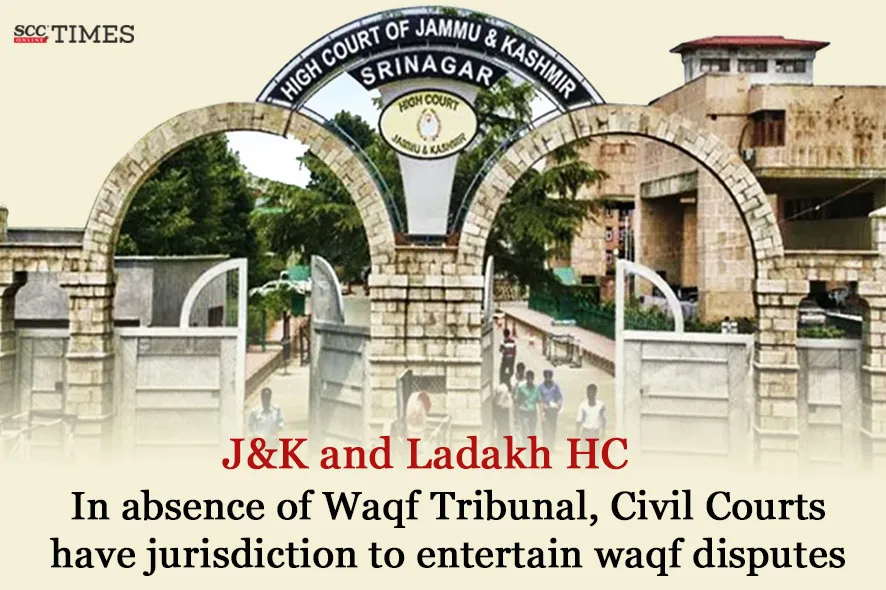Jammu & Kashmir and Ladakh High Court: The J&K Board for Muslim Specified Wakfs & Specified Wakf Property (the ‘Board’) brought this revision petition challenging the order passed by the Trial Court wherein its application for the rejection of the plaint, was dismissed. The rejection was prayed on the ground that the Civil Court was expressly barred by the Waqf Act, 1995 (‘Waqf Act’), from entertaining a suit related to waqf property. A Single Judge Bench of Sanjay Dhar, J., agreed with the Trial Court, and held that since the Waqf Tribunal was not constituted for hearing the present matters related to waqf properties, the Civil Court had the jurisdiction to hear such suits.
Background:
The Soura Shopkeepers Welfare Association (the ‘Association’) filed a suit against the Board wherein it claimed that its members were tenants of the Board’s shops situated in Wakf Complex, Soura. The members stated that they had deposited a huge sum of money with the Board for the construction of the complex. The shops were allotted in 2005, and the rent was fixed, which was to increase by 15 per cent initially after five years and subsequently after the expiry of three financial years. But the Board, on 21-7-2022, decided to revise the rent from 1-4-2018, thereby enhancing the rent by 120 per cent. The Association sought a declaration that the decision of the Board was null and void with a mandatory injunction commanding the Board to accept the rent as per the lease deed executed between the parties, along with a permanent injunction that the Board should be restrained from evicting the members of the Association.
The Board filed an application under Order 7 Rule 11 CPC before the Trial Court seeking the rejection of the plaint and contended that Section 85 of the Waqf Act expressly barred the jurisdiction of the civil court to entertain waqf disputes. It alleged that as per Section 83 of the Waqf Act, the Tribunal was the authorised body to take up matters of waqf properties. The Association however pointed out that no Tribunal under the Waqf Act had been constituted and, as such, the statutory forum was not available for redressal of its grievance. The Trial Court concluded that the Association should not be rendered remediless and dismissed the application of the Board and held that the suit was maintainable.
The Board challenged the order of the Trial Court and submitted that the maxim ‘ubi jus ibi remedium’ applied only to cases where there was no express bar to the jurisdiction of the civil court and merely because the Waqf Tribunal had not been constituted, the bar to filing of a civil suit as contained in Section 85 of the Waqf Act could not be negated.
Analysis and Decision:
The Court addressed the question as to whether the subject matter of the suit could be adjudicated upon by the machinery provided under the Waqf Act and after referring to Section 83, held that a Tribunal constituted by the State Government had jurisdiction to determine any dispute, question or other matter relating to a waqf or waqf property, eviction of a tenant or determination of rights and obligations of the lessor and the lessee of such property and concluded that the said matter was cognizable by that Tribunal. Further, the Court clarified that as per Section 85 of the Waqf Act, the matters which were required to be determined by the Tribunal under the Act could not be decided by a civil court, revenue court, or any other authority.
The Court then considered whether in the absence of a Tribunal for determination of waqf disputes cognizable by it, the civil court could entertain those suits and opined that under Section 9 CPC, the civil court had very wide jurisdiction to entertain a suit of civil nature and could only refuse it in cases where a suit was either expressly or impliedly barred. The Court referred to Dhulabhai v. State of Madhya Pradesh, 1968 SCC OnLine SC 40, and inferred that even in a case where there was an express bar for exercising jurisdiction by the civil courts, the consideration as to the scheme of the statute in question and the adequacy or sufficiency of the remedy provided, was permissible in law.
The Court observed that the constitution of a Tribunal in terms of Section 83 of the Waqf Act was a pre-condition for invoking the provisions contained in Section 85 of the said Act. If no Tribunal had been constituted, there would be no forum to determine a dispute or question relating to waqf property. The Court noted that since the Tribunal was not yet constituted, a litigant agitating a waqf dispute, did not have any remedy for redressal of his grievance and hence the bar to the jurisdiction of the civil courts as contained in Section 85 of the Waqf Act would not come into play.
Consequently, the Court found no ground for the exercise of its revisional jurisdiction and dismissed the petition by an ex parte order and further provided that if during the pendency of the suit, the Tribunal under Section 83 of the Waqf Act was constituted by the Government, the Trial Court shall transfer the suit to the said Tribunal.
[J&K Board for Muslim Specified Wakfs & Specified Wakf Property v. Soura Shopkeepers Welfare Association, 2025 SCC OnLine J&K 690, decided on 11-7-2025]
Advocates who appeared in this case :
For the Petitioner: Ruaani Ahmad Baba, Advocate.


